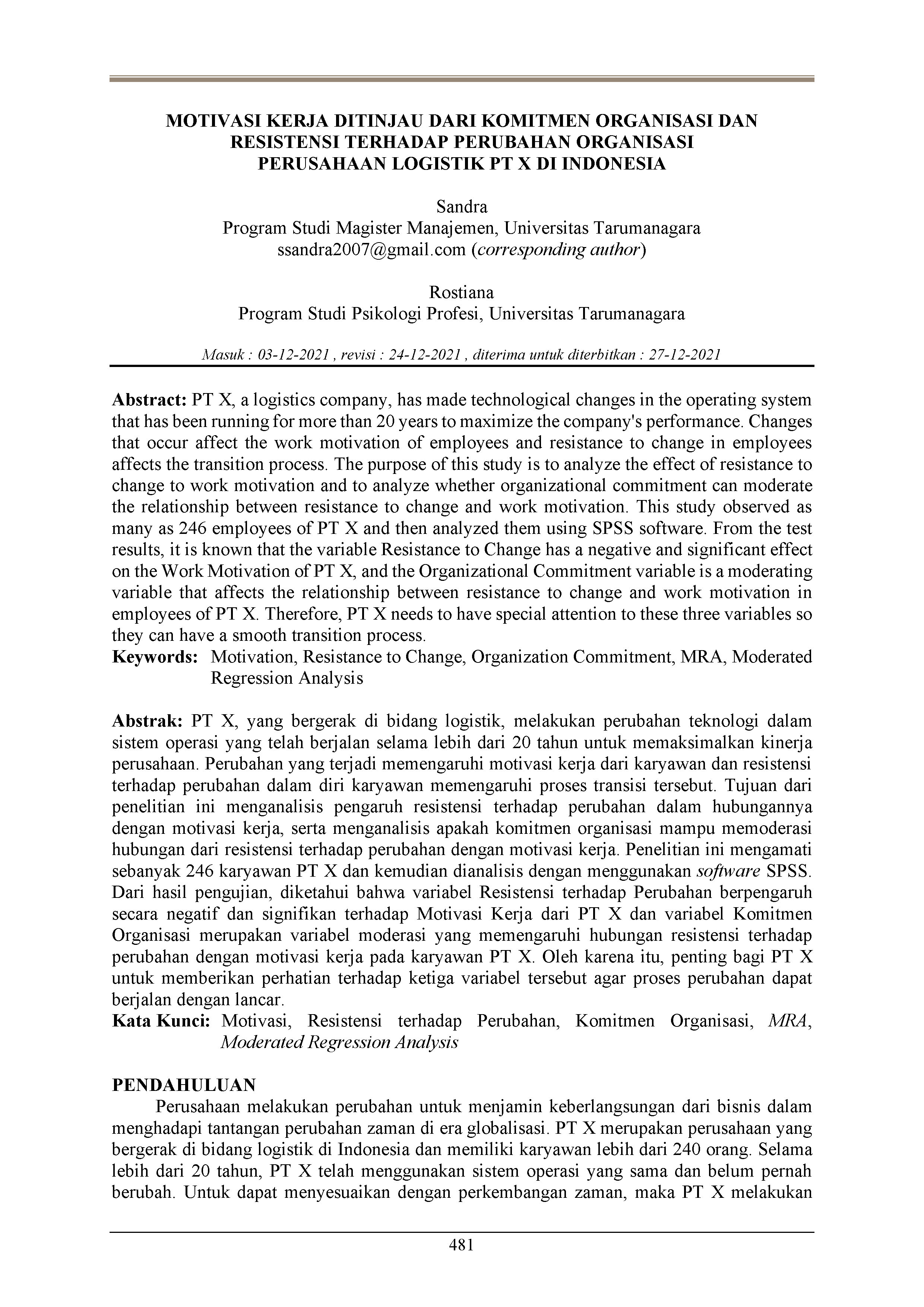Motivasi Kerja Ditinjau dari Komitmen Organisasi dan Resistensi terhadap Perubahan Organisasi Perusahaan Logistik PT X di Indonesia
Main Article Content
Abstract
PT X, a logistics company, has made technological changes in the operating system that has been running for more than 20 years to maximize the company's performance. Changes that occur affect the work motivation of employees and resistance to change in employees affects the transition process. The purpose of this study is to analyze the effect of resistance to change to work motivation and to analyze whether organizational commitment can moderate the relationship between resistance to change and work motivation. This study observed as many as 246 employees of PT X and then analyzed them using SPSS software. From the test results, it is known that the variable Resistance to Change has a negative and significant effect on the Work Motivation of PT X, and the Organizational Commitment variable is a moderating variable that affects the relationship between resistance to change and work motivation in employees of PT X. Therefore, PT X needs to have special attention to these three variables so they can have a smooth transition process.
PT X, yang bergerak di bidang logistik, melakukan perubahan teknologi dalam sistem operasi yang telah berjalan selama lebih dari 20 tahun untuk memaksimalkan kinerja perusahaan. Perubahan yang terjadi memengaruhi motivasi kerja dari karyawan dan resistensi terhadap perubahan dalam diri karyawan memengaruhi proses transisi tersebut. Tujuan dari penelitian ini menganalisis pengaruh resistensi terhadap perubahan dalam hubungannya dengan motivasi kerja, serta menganalisis apakah komitmen organisasi mampu memoderasi hubungan dari resistensi terhadap perubahan dengan motivasi kerja. Penelitian ini mengamati sebanyak 246 karyawan PT X dan kemudian dianalisis dengan menggunakan software SPSS. Dari hasil pengujian, diketahui bahwa variabel Resistensi terhadap Perubahan berpengaruh secara negatif dan signifikan terhadap Motivasi Kerja dari PT X dan variabel Komitmen Organisasi merupakan variabel moderasi yang memengaruhi hubungan resistensi terhadap perubahan dengan motivasi kerja pada karyawan PT X. Oleh karena itu, penting bagi PT X untuk memberikan perhatian terhadap ketiga variabel tersebut agar proses perubahan dapat berjalan dengan lancar.
Article Details

This work is licensed under a Creative Commons Attribution-NonCommercial-ShareAlike 4.0 International License.
This work is licensed under a Jurnal Manajemen Bisnis dan Kewirausahaan Creative Commons Attribution-ShareAlike 4.0 International License.
References
Aninkan, D. O. (2018). Organizational change, change management, and resistance to change-An exploratory study. European Journal of Business and Management, 10(26), 109–117. https://www.iiste.org/Journals/index.php/EJBM/article/view/44159/45545
Coch, L., & French, J. R. P. (1948). Overcoming resistance to change. Human Relations, 1(4), 512–532. https://doi.org/10.1177/001872674800100408
Culmer, N. P. (2012). I.T. changes: An exploration of the relationship between motivation, trust, and resistance to change in information technology [Doctoral Thesis, University of Iowa]. https://doi.org/10.17077/etd.415omaka
Dovey, K. (2009). The role of trust in innovation. Learning Organization, 16(4), 311–325. https://doi.org/10.1108/09696470910960400
Liou, S. R. (2008). An analysis of the concept of organizational commitment. Nursing Forum, 43(3), 116–125. https://doi.org/10.1111/j.1744-6198.2008.00103.x
Muo, I. (2014). The other side of change resistance. International Review of Management and Business Research, 3(1), 96–113. https://www.irmbrjournal.com/papers/1389634033.pdf
O’Reilly, C. A., & Chatman, J. (1986). Organizational commitment and psychological attachment: The effects of compliance, identification, and internalization on prosocial behavior. Journal of Applied Psychology, 71(3), 492–499. https://doi.org/10.1037/0021-9010.71.3.492
Oreg, S. (2003). Resistance to change: Developing an individual differences measure. Journal of Applied Psychology, 88(4), 680–693. https://doi.org/10.1037/0021-9010.88.4.680
Pinder, C. C. (1998). Work motivation in organizational behavior. Prentice Hall.
Pradana, O. A., Swasto, B., & Utami, H. N. (2014). Pengaruh motivasi kerja dan komitmen organisasional terhadap kinerja karyawan (Studi pada karyawan bagian HRD PT. Arthawena Sakti Gemilang Malang). Jurnal Administrasi Bisnis (JAB), 7(2), 1–9. http://administrasibisnis.studentjournal.ub.ac.id/index.php/jab/article/view/324
Semerciöz, F., Hassan, M., & Aldemir, Z. (2011). An empirical study on the role of interpersonal and institutional trust in organizational innovativeness. International Business Research, 4(2), 125–136. https://doi.org/10.5539/ibr.v4n2p125
Tremblay, M. A., Blanchard, C. M., Taylor, S., Pelletier, L. G., & Villeneuve, M. (2009). Work extrinsic and intrinsic motivation scale: Its value for organizational psychology research. Canadian Journal of Behavioural Science, 41(4), 213–226. https://doi.org/10.1037/a0018176
Ude, S., & Diala, I. (2015). Support for creativity and innovation, resistance to change, organizational commitment and motivation. International Journal of Computer & Organization Trends, 5(4), 1–8. https://doi.org/10.14445/22492593/ijcot-v22p301
Urdan, T. C. (2016). Statistics in plain english (4th ed.). Routledge. https://doi.org/10.4324/9781315723112
Vicente-Lorente, J. D., & Zúñiga-Vicente, J. Á. (2012). Effects of process and product-oriented innovations on employee downsizing. International Journal of Manpower, 33(4), 383–403. https://doi.org/10.1108/01437721211243750


